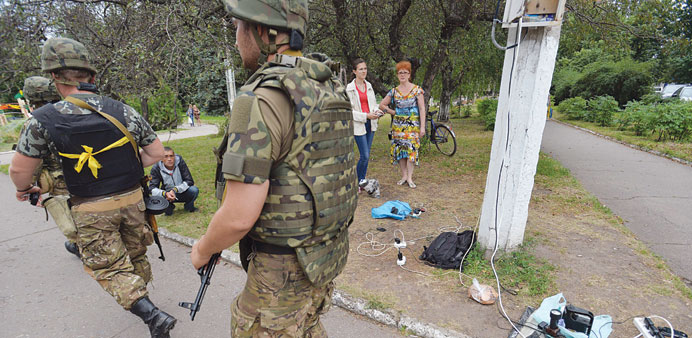AFP/Reuters
Ukraine’s Western-backed leaders have invited pro-Kremlin insurgents to a videoconference aimed at halting spiralling violence and what Kiev warned was an imminent invasion by thousands of Russian troops.
Kiev sharply raised the stakes in Europe’s most explosive crisis in decades by declaring on Monday that a Ukrainian transport plane downed in the eastern conflict zone had been hit by a rocket fired from the Russian side of the frontier between the two former Soviet states.
Russia has broken with its traditional denials of all links to the uprising by not publicly responding to the charge.
A top Ukrainian general went a step further by telling a live television audience in Kiev that he feared a Russian invasion was imminent.
“Ukraine, like never before, stands on the cusp of a wide-scale aggression from our current northern border,” said National Security and Defence Council Deputy Secretary Mykhaylo Koval.
The former defence minister said the Kremlin had parked 22,000 troops in the annexed Black Sea peninsula of Crimea and had other units stretching from the north-central region of Chernigiv to the southeastern edge of the Russian-Ukrainian border on the Sea of Azov.
Ukrainian President Petro Poroshenko’s office said Foreign Minister Pavlo Klimkin also presented “photo and video evidence” of Russia covertly supplying the fighters with weapons and armoured vehicles.
President Vladimir Putin rejects accusations of orchestrating the uprising in reprisal for the February ouster of a Russian-backed leader and Kiev’s subsequent signature of a historic EU deal instead of a new Kremlin pact.
Fears of Russia’s direct intervention and the soaring civilian toll – 23 more people were reported killed overnight – has intensified pressure on Western allies to quickly address their worst stand-off with Russia since the Cold War.
Germany and France have been spearheading EU efforts to revive a Ukrainian truce that could save the bloc from having to introduce sweeping economic sanctions against energy-rich Russia to which Putin has already vowed to respond.
The United States has pressed EU leaders to impose arms sale restrictions and limited financial sanctions on Russia when they meet at a summit in Brussels today.
“Tomorrow in Brussels, the heads of state and government will again assess the situation on the ground and, should it be required, adopt necessary decisions,” the bloc’s enlargement commissioner Stefan Fuele told the European Parliament yesterday in Strasbourg.
Indirect negotiations between Kiev – represented by former president Leonid Kuchma – and the separatists aimed at extending a shaky 10-day ceasefire fizzled out after two rounds last month.
But Poroshenko’s office said he had agreed with Germany Chancellor Angela Merkel to arrange “Skype videoconference talks” that Kiev had first suggested last week.
The border became the conflict’s new frontline after rebels last week evacuated a host of towns and cities that they had held since early April in the coal mining region of Donetsk.
The militias have since concentrated their forces around the cities of Donetsk and Luhansk – both capitals of their own “People’s Republics” – and are hoping for new weapons deliveries to revive their campaign.
Witnesses in Donetsk told AFP that they had seen the insurgents dispatch four tanks and eight armoured transport vehicles towards Luhansk to help repel an intensifying air and artillery push by Kiev forces on the city of 420,000 people.
Defence officials said four of the downed plane’s eight crew had been rescued in rebel territory.
“Two servicemen were captured by the rebels and efforts to rescue them are underway. The fate of the other two crew is unknown,” the Ukrainian military said in a statement.
Ukraine also temporarily grounded all its jets in the two separatist regions as a safety precaution.
Yesterday Luhansk declared three days mourning for 17 civilians killed since the weekend in artillery strikes that both sides have blamed on each other.
But local authorities reported the death of nearly two dozen more civilians across the rustbelt – including 11 people killed when their building apartment block crumbled after being hit by a missile in the Russian border town of Snizhne.
A separatist leader was quoted by Russia’s Interfax news as saying the attack had been the work of a Ukrainian warplane.
But military officials and the foreign ministry said no Ukrainian fighter planes had taken off since Monday because a search and rescue operation was underway in the area for survivors of the downed An-26.
“Today at 7am (0400 GMT) an unknown plane carried out a bombing attack on Snizhne. The flight can be described only as a cynical provocation,” Andriy Lysenko, a spokesman for Ukraine’s National Defence and Security Council, told reporters.
A defence spokesman said six Ukrainian soldiers had also been killed overnight as the toll in the low-scale war approached 600 civilians and fighters on both sides.
The National Security and Defence Council reported the death of 258 servicemen and capture of another 45 since Kiev launched its “anti-terrorist operation” on April 13.

